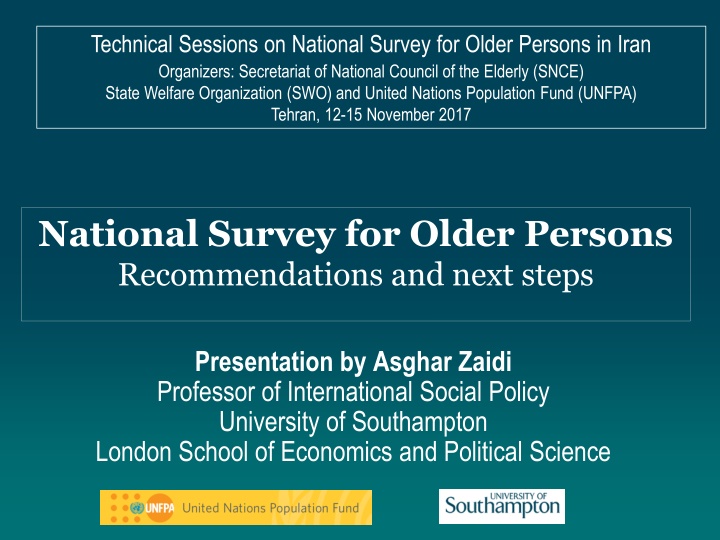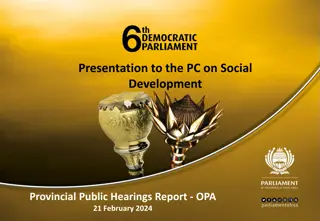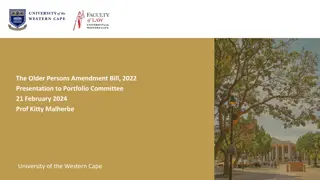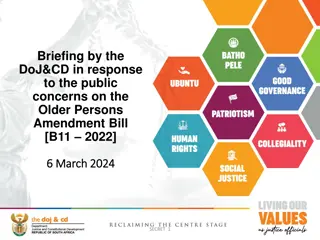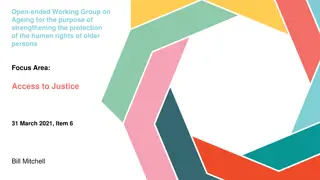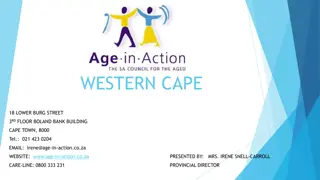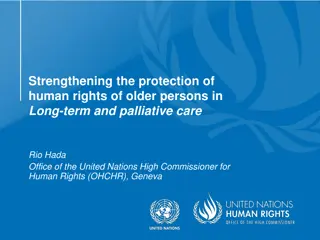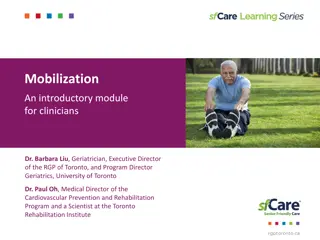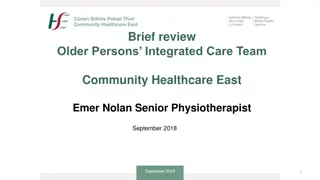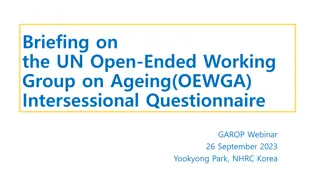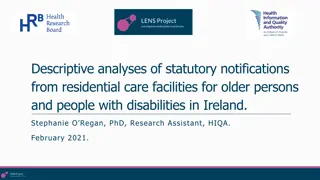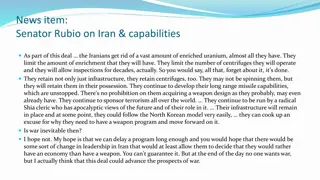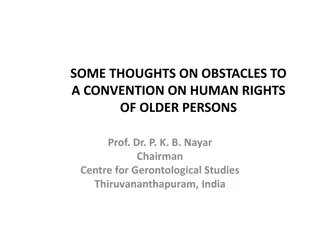Technical Sessions on National Survey for Older Persons in Iran: Recommendations and Next Steps
Organized by Secretariat of National Council of the Elderly, State Welfare Organization, and United Nations Population Fund, this event featured presentations and key recommendations by experts like Asghar Zaidi on improving survey protocols and data collection methods for older individuals in Iran.
Download Presentation

Please find below an Image/Link to download the presentation.
The content on the website is provided AS IS for your information and personal use only. It may not be sold, licensed, or shared on other websites without obtaining consent from the author.If you encounter any issues during the download, it is possible that the publisher has removed the file from their server.
You are allowed to download the files provided on this website for personal or commercial use, subject to the condition that they are used lawfully. All files are the property of their respective owners.
The content on the website is provided AS IS for your information and personal use only. It may not be sold, licensed, or shared on other websites without obtaining consent from the author.
E N D
Presentation Transcript
Technical Sessions on National Survey for Older Persons in Iran Organizers: Secretariat of National Council of the Elderly (SNCE) State Welfare Organization (SWO) and United Nations Population Fund (UNFPA) Tehran, 12-15 November 2017 National Survey for Older Persons Recommendations and next steps Presentation by Asghar Zaidi Professor of International Social Policy University of Southampton London School of Economics and Political Science
Day 1 Sunday, 12th November 2017
Key features of the SHARE Session 2 on the 1st day Human rights approach provide further insights
Key features of the SHARE Session 2 on the 1st day Recommendation 1: Define a clear goal and protocols for the new survey for older persons, for example the overall goal of the survey can be Collect data and monitor the well-being and quality of life of older persons in Islamic Republic of Iran Recommendation 2: Continue on the journey of informal learning from SHARE and other surveys (without a formal partnership with the SHARE team at this stage) this approach will be cost efficient and prevents delays!
Day 2 Monday, 13th November 2017
Adapting the SHARE questionnaire Session 1 on the 2nd day Rec. 3: Start with a reduced form of questionnaire, including only a core set of modules (leave out non-urgent novelties) Rec. 4: Include an additional module on age-friendly environments (and add questions about maintaining dignity and independence in old age) Rec. 5: Align data collection with the national strategy on older persons, so that the survey can provide the baseline position Rec. 6: Adopt a careful phrasing in the questionnaire to account for the sensitivities in Iran (e.g. mental health, abuse)
Timetable for the survey Session 2 on the 2nd day Rec. 7: Aim to start the main survey at the latest by Autumn 2018, the report for the pilot survey and the sampling method to be ready before summer 2018
Day 3 Tuesday, 14th November 2017
Sampling Session 3 on the 2nd day Rec. 8: Follow the basic principles of probability-based selection and maximum population coverage (of private households, for persons born in 1968 or earlier) Rec. 9: Boost the sample for 70+ to enable better precision for this subgroup (more for women than men) Rec. 10: Sample size large enough to allow disaggregation of results across provinces Rec. 11: Exclude institutional households (prisons, hospitals) and those who do not speak Persian or the local language
Data collection Session 1 on the 3rd day Rec. 12: Hire lady interviewers for female respondents; no compromises on the timely payment for the interviewers Rec. 13: A strong motivational statement at the start of the interviewing to reduce non-response (even playing a video from a celebrity) Rec. 14: Paper questionnaire can be used if it is more cost effective (to be replaced by a CAPI version in the future); avoid telephonic or online interviews, especially for very old persons
Data quality Session 1 on the 3rd day Rec. 15: Checks by supervisors on each day of the data collection following well-defined routines (if the paper questionnaire is used) Rec. 16: The total interviewing time should not be more than 60 minutes (on average) in the first wave Rec. 17: CAPI method should be followed from the second wave onwards, with loops included to check the data quality
Training of interviewers Session 1 on the 3rd day Rec. 18: Specialised extended training to be provided to the interviewers keeping in view the complex nature of the questionnaire and ethics of surveying older persons Rec. 19: Offer specialised training on how best to collect data from the sick and mentally sick; prepare a protocol for this purpose alone
Pilot study Session 2 on the 3rd day Rec. 20: Undertake the pilot study as if you are conducting the main survey (but with a smaller sample) Rec. 21: Prepare a pilot study report providing information on the following aspects: Time required to complete different questionnaire parts What experience of using a proxy respondent? How sensitive questions (abut abuse, alcohol consumption) can be rephrased Insights from the data collected, on logistics, etc.
Analysis and dissemination Session 3 on the 3rd day Rec. 22: Prepare results on a range of indicators and policy briefs to serve as the baseline for the new strategy for older persons Rec. 23: Analyse with a gender sensitive lens and draw out clear recommendations for future waves of data Rec. 24: Prepare protocols for the use of the data, keeping the data confidentiality intact but also promoting research; the steering committee of the Council to provide further recommendations about how to avoid misuse of the data.
My thanks to the workshop participants and to UNFPA for all their support For more information asghar.zaidi@soton.ac.uk
